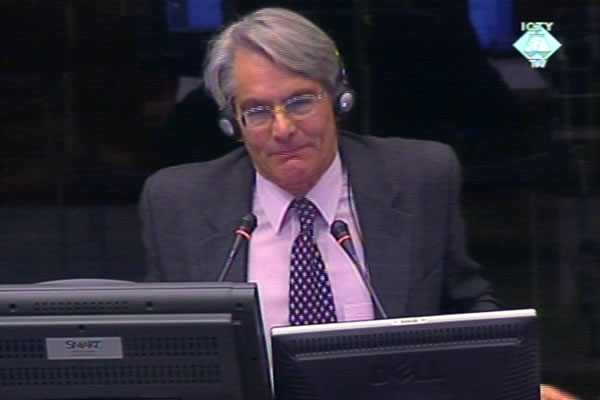Home
KARADZIC – VICTIM OF DOUBLE CONSPIRACY
Radovan Karadzic continued his cross-examination of British general Rupert Smith by highlighting the efforts of Slobodan Milosevic and some international players to ‘marginalize’ him. He also spoke about how the ‘powerful players’ decided in the summer of 1995 to bomb the Bosnian Serbs at any cost; the Serbs ‘could do nothing to prevent it’
 Rupert Smith, witness at the Radovan Karadzic trial
Rupert Smith, witness at the Radovan Karadzic trial Karadzic completed his cross-examination of the last UNPROFOR commander in BH, General Rupert Smith. In the last part of the cross-examination, Karadzic brought up the two conspiracies that involved him in 1995: this despite his general dislike of conspiracy theories.
The first conspiracy was aimed against Karadzic himself. The goal was to cause a rift in Pale, to marginalize the Bosnian Serb political leadership and to ‘make Mladic turn against Karadzic’. Slobodan Milosevic pulled the strings of the conspiracy from Belgrade, with the support of various international players. This is evidenced by the book written by the then EU Special Representative for former Yugoslavia Carl Bildt, who said that ‘Mladic was used to undermine Karadzic’. General Smith denied that anybody asked him to participate in the effort to ‘isolate Karadzic’, although he admitted that this idea was floated in 1994, and again in the summer of 1995. ‘Lots of things were done behind my back and I was asked to comply with agreements I didn’t sign’, Karadzic lamented.
Prosecutor Tieger returned to the issue in the re-examination, asking General Smith if the idea to isolate Karadzic was born of ‘personal dislike or because he was a person who controlled the events those people wanted to change’. There was belief that it would be easier to conclude a peace agreement with Milosevic ‘who was more amenable then Karadzic’, General Smith replied.
According to Karadzic, the second conspiracy was aimed against Republika Srpska and Bosnian Serbs in general. Various ‘powerful players’ decided in the summer of 1995 to bomb the Bosnian Serbs at any cost in the interest of maintaining the credibility of NATO, improving the relations between Europe and America. Some Western powers had their own internal political motives. They were ‘much bigger players than us, of the paltry million and a half Bosnian Serbs who couldn’t do anything to avoid the air strikes’.
General Smith who called in the NATO air strikes against the VRS facilities twice in 1995 disagreed with this analysis. The Bosnian Serbs in fact made him decide with their actions what moves he would make. ‘I didn’t dictate those moves, my job was to respond to them’, the witness said. ‘The moves’ Smith responded to in May and August 1995 were the violation of the exclusion zone for heavy artillery around Sarajevo and shelling of the protected area that resulted in the second Markale massacre.
Karadzic also tried to convince General Smith that the UN soldiers used as human shields against NATO airstrikes in May and June 1995 by the Bosnian Serbs were not hostages but prisoners of war. Karadzic explained they were ‘on active duty in the UN army’ and he had personally warned them that – if NATO struck – they would be ‘considered the enemy’. General Smith dismissed this claim too, saying, ‘I do not consider as prisoners of war the people who are chained to a lamp post or to a gate of a military facility and who are threatened their throats would be slit. I consider them to be hostages’, General Smith concluded.
After General Smith completed his evidence Karadzic continued with his cross-examination of Tihomir Glavas, due to be completed tomorrow.
Linked Reports
- Case : Karadzic
- 2011-02-14 CRISIS STAFFS IN ‘ROUGH AND HARD TIMES’
- 2011-02-14 EARLY NIGHTFALL IN SARAJEVO
- 2011-02-11 WHO HAD THE OBLIGATION TO DEMILITARIZE PROTECTED AREAS
- 2011-02-16 CHAOS, GOSSIP AND POSITIVE DISCRIMINATION IN HADZICI
- 2011-02-17 SURVIVOR OF BUS MASSACRE GIVES EVIDENCE
- 2011-02-22 PROFESSOR ZECEVIC MOVES FROM DOCK TO WITNESS STAND
